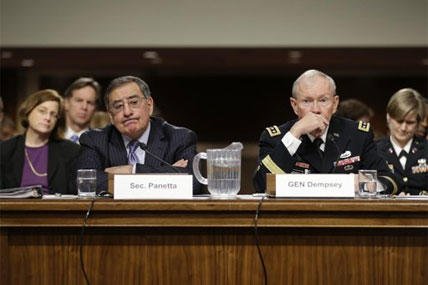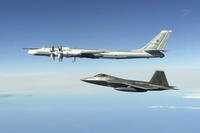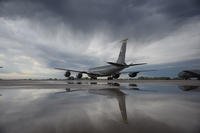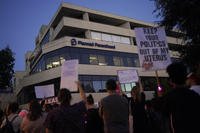Army Gen. Martin Dempsey, chairman of the Joint Chiefs of Staff, sparred with Sen. John McCain (R-Ariz.) Thursday on whether the military could have prevented the attacks on Benghazi, Libya that killed Ambassador Chris Stevens and three other Americans.
At a hearing of the Senate Armed Services Committee on the Sept. 11, 2011 attacks on the consulate and an annex used by the CIA about a mile away, McCain immediately challenged Dempsey’s prepared remarks that "our military was appropriately responsive. We did what our posture and capabilities allowed."
McCain called Dempsey’s assessment "one of the more bizarre statements I’ve ever seen in my years here at the Committee."
Dempsey shot back that "I stand by my testimony, your dispute of it notwithstanding."
Dempsey said that an unarmed reconnaissance drone was diverted to fly over Benghazi as the attacks began, and air and ground forces in Europe were put on alert, but the attacks ended before they could be deployed.
McCain charged that the Defense Department had ignored earlier threat warnings from Stevens that the consulate could not sustain an attack, and failed to deploy troops and attack aircraft that were available in the region over the course of the separate attacks on the consulate and the annex in a period of nearly eight hours.
Dempsey failed in his duty to "take into account the threats to that consulate, and that’s why four Americans died," McCain said angrily.
Based on Stevens’ warning, McCain suggested that the military should have deployed attack aircraft and troops to the U.S. base at Suda Bay, Crete -- an hour’s flight time from Benghazi.
"Our posture was not there , we could have placed forces there. We could have had aircraft," McCain said. For Dempsey to say otherwise "is simply false," McCain said.
Dempsey stuck to his initial position, even as McCain repeatedly interrupted. Dempsey said that the warnings about Benghazi were similar to the threats against embassies in Cairo, Yemen, and more than 100 other U.S. facilities around the world. Dempsey also said the attacks in Benghazi were over and U.S. personnel there had been evacuated well before the U.S, military could have responded.
"We never received a request for support from the State Department" before the attacks on Benghazi despite the warning from Stevens, Dempsey said.
Dempsey said that he and Defense Secretary Leon Panetta knew of Stevens’ warning from Gen. Carter Ham, the head of the African Command. When asked later what he thought of the statements from then-Secretary of State Hillary Clinton that she was unaware of Stevens’ warning, Dempsey said "I would call myself surprised that she didn’t" know of the warning.
In hindsight, only U.S. troops in Benghazi before the attacks could have saved lives, Dempsey said. "The appropriate platform would have been boots on the ground ahead of the event," Dempsey said.
Other Republicans on the Committee joined McCain in questioning why the military didn’t send F16s or AC-130 gunships to drive off the terrorists attacking Benghazi, but Dempsey and Defense Secretary Leon Panetta, who also testified, said there simply wasn’t time and they lacked the intelligence to mount an effective response.
Dempsey said there wasn’t an AC-130 gunship within 1,000 miles of Benghazi and the nearest F16s at a base in Aviano, Italy, were not on standby alert and would not have reached Benghzi in time.
Panetta added that "you can’t just willy-nilly send F16s there and blow the hell out of a place without knowing what’s taking place."
Sen. Lindsey Graham (R-S.C.) questioned the concern shown by President Obama for the fate of the Americans -- Stevens, Information Management Officer Sean Smith, and security personnel Tyrone Woods, and Glen Doherty – as the attacks unfolded.
Panetta said that Obama consulted with him and Dempsey when they first learned that Benghazi was under attack, and that was their only discussion during the course of the attacks. Panetta stressed that the one discussion was not an indication of a lack of concern but Graham said "I don’t believe that’s a credible statement."
After several Republicans hammered at Dempsey and Panetta, Sen. Jeanne Shaheen (D-N.H.) said that "grandstanding and finger pointing is not really helpful" in analyzing the events at Benghazi or in preventing a recurrence.
Earlier, Panetta warned that plans to beef up security at U.S. diplomatic facilities worldwide with more Marine guards would be jeopardized if Congress and the White House failed to reach a deal to avoid the process known as "sequester" on March 1, and the massive cuts to defense budgets that would follow.
"We have agreed with the Department of State to add 35 new Marine Security Guard detachments (about 1,000 Marines) over the next two to three years, in addition to the 152 detachments in place today," Panetta said.
"Whatever steps are required to be taken to properly posture U.S. forces for possible emergency response operations would be seriously impacted by the readiness crisis caused by uncertainty or dramatically reduced resources," Panetta said. "The responsibility to protect our citizens rests with both the Administration and the Congress."






























